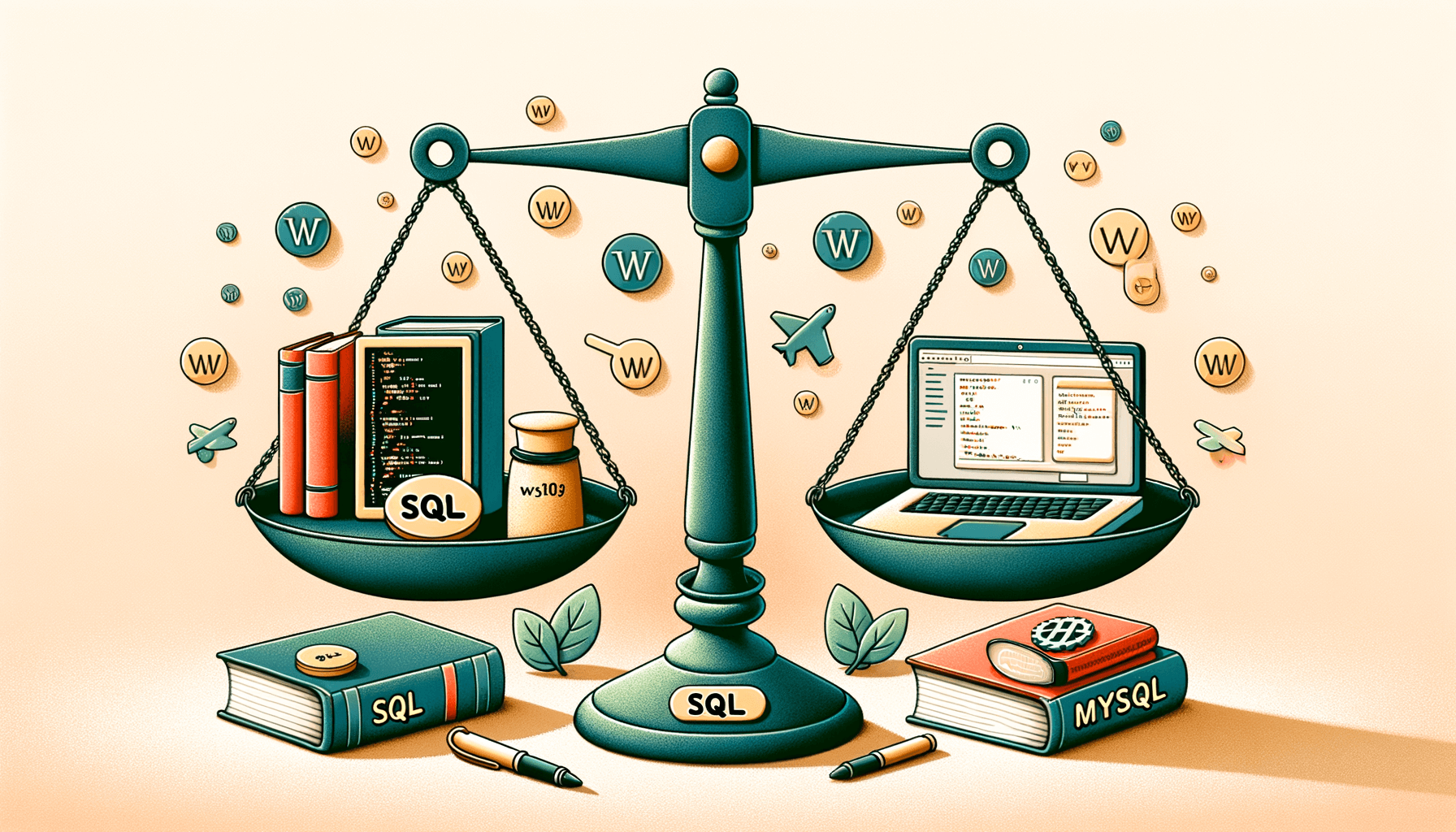A big variety of articles and resources

Should I learn SQL or MySQL to be very good in WordPress?
 Sia Author and Instructor
Learn SQL
Sia Author and Instructor
Learn SQL
13 minute read
Deciding whether to learn SQL or MySQL can be a bit confusing, especially if you're looking to improve your skills in WordPress. Both are important, but they serve different purposes. This article will help you understand what each one does, how they differ, and which one might be more useful for your WordPress projects.
Key Takeaways
- SQL is a language used to manage and manipulate databases.
- MySQL is a database management system that uses SQL as its language.
- In WordPress, databases play a crucial role in storing and retrieving data.
- Learning SQL can improve your ability to write custom queries and manage data efficiently.
- Mastering MySQL can help you optimize WordPress performance and troubleshoot database issues.
Understanding SQL and MySQL: Definitions and Differences
Defining SQL: The Language of Databases
SQL, or Structured Query Language, is the standard language used to communicate with databases. It allows us to create, read, update, and delete data stored in a database. SQL is essential for managing and manipulating data efficiently.
What is MySQL? An Overview
MySQL is a popular open-source database management system that uses SQL to interact with the data. It is widely used in web applications, including WordPress, due to its reliability and performance. MySQL helps us store and organize data in a structured way.
Key Differences Between SQL and MySQL
While SQL is a language, MySQL is a software that uses this language to manage databases. Here are some key differences:
- SQL: A language used for database operations.
- MySQL: A database management system that uses SQL.
In summary, understanding both SQL and MySQL is crucial for anyone looking to excel in WordPress development. They each play a unique role in managing and interacting with databases effectively.
The Role of Databases in WordPress
How WordPress Utilizes Databases
In WordPress, databases are the backbone that store all the essential data. This includes everything from user information to post content and settings. Without a database, WordPress simply wouldn't function. The platform uses a MySQL database to manage and retrieve this data efficiently.
Common Database Operations in WordPress
WordPress performs several database operations regularly. These include creating, reading, updating, and deleting data, often referred to as CRUD operations. For instance, when you publish a new post, WordPress inserts this data into the database. Similarly, when you edit a post, it updates the existing data.
Importance of Database Management in WordPress
Proper database management is crucial for maintaining the performance and security of your WordPress site. Poorly managed databases can lead to slow load times and even data loss. Regular backups and optimizations are essential practices to ensure your database runs smoothly.
Effective database management can significantly enhance your WordPress site's performance and reliability.
Benefits of Learning SQL for WordPress Development
Enhanced Data Manipulation Skills
Learning SQL can significantly improve our ability to handle data within WordPress. By mastering SQL, we can efficiently retrieve, update, and delete data from the database. This skill is crucial for customizing WordPress sites to meet specific needs. Understanding SQL basics through courses like the sqlmicro course: essentials course can provide a solid foundation for these tasks.
Improved Database Querying Efficiency
With SQL, we can write optimized queries that enhance the performance of our WordPress sites. Efficient queries reduce the load on the server and speed up data retrieval, which is essential for maintaining a fast and responsive website. This is especially important for sites with large amounts of data.
Better Understanding of WordPress Core
By learning SQL, we gain a deeper understanding of how WordPress interacts with its database. This knowledge helps us troubleshoot issues more effectively and make informed decisions when developing or customizing themes and plugins. It also allows us to appreciate the architecture of WordPress and how it manages data behind the scenes.
Mastering SQL not only boosts our technical skills but also empowers us to create more dynamic and efficient WordPress sites. This foundational knowledge is invaluable for any serious WordPress developer.
Advantages of Mastering MySQL for WordPress
Optimizing WordPress Performance
Mastering MySQL can significantly boost the performance of your WordPress site. By understanding how to efficiently manage and query your database, you can reduce load times and improve user experience. Optimized databases lead to faster page loads, which is crucial for keeping visitors engaged.
Customizing WordPress Database Structures
With MySQL skills, you can tailor the database structure to better fit your specific needs. This customization allows for more efficient data storage and retrieval, making your site more responsive. You can create custom tables and fields, enhancing the functionality of your WordPress site.
Troubleshooting Database Issues
Knowing MySQL enables you to quickly identify and fix database-related problems. This skill is invaluable for maintaining the health of your WordPress site. Whether it's a minor glitch or a major issue, being able to troubleshoot effectively can save you time and prevent potential data loss.
Mastering MySQL not only improves your site's performance but also gives you the tools to customize and troubleshoot your database, ensuring a smooth and efficient WordPress experience.
sqlskillz.com vs udemy.com: master sql basics, perfect for beginners, learn at your own pace. no credit card required. login or sign up to start learning.
SQL vs. MySQL: Which is More Relevant for WordPress?
Use Cases for SQL in WordPress
When working with WordPress, SQL is essential for writing custom queries. These queries help us fetch specific data from the database, making our websites more dynamic and interactive. For instance, we can use SQL to display a list of recent posts or to find users who registered in the last month. SQL's flexibility allows us to manipulate data in various ways, which is crucial for tailoring WordPress to our needs.
When to Use MySQL in WordPress
MySQL is the database management system that stores all the data for a WordPress site. It is optimized for handling large amounts of data efficiently. We use MySQL to set up and manage the database, ensuring that our WordPress site runs smoothly. MySQL's performance optimization features are particularly useful for high-traffic websites, where speed and reliability are critical.
Comparative Analysis of SQL and MySQL in WordPress
While SQL is the language we use to interact with the database, MySQL is the system that manages the database. Both are essential for WordPress development, but they serve different purposes. SQL allows us to write queries and manipulate data, while MySQL ensures that the data is stored and retrieved efficiently. In essence, SQL is the tool we use to communicate with the database, and MySQL is the engine that powers it.
Understanding the roles of both SQL and MySQL in WordPress helps us make informed decisions about database management and optimization. By mastering both, we can enhance our WordPress development skills and create more efficient, dynamic websites.
Practical Applications of SQL in WordPress
Writing Custom Queries
In WordPress, we often need to write custom queries to fetch specific data from the database. This is where SQL shines. By mastering SQL, we can create precise queries that pull exactly the information we need, making our WordPress sites more dynamic and responsive.
Database Backup and Restoration
Backing up and restoring databases is a crucial task for any WordPress developer. Using SQL commands, we can easily export and import database data. This ensures that our site can be quickly restored in case of any issues, keeping downtime to a minimum.
Data Analysis and Reporting
SQL is also invaluable for data analysis and reporting. By running SQL queries, we can analyze user data, track site performance, and generate reports. This helps us make informed decisions to improve our WordPress sites.
Mastering SQL allows us to handle data more effectively, ensuring our WordPress projects run smoothly and efficiently.
For those looking to enhance their skills, a data analyst - introduction to sql course offers hands-on projects, personalized support, and industry best practices for effective sql application. Instructor Eric Vanier specializes in database optimization and management.
Implementing MySQL in WordPress Projects
Setting Up MySQL for WordPress
To start with MySQL in WordPress, we need to install and configure the MySQL server. This involves downloading the MySQL software, running the installer, and setting up a root password. Once MySQL is installed, we create a new database for our WordPress site. This database will store all the content, settings, and user information for our site.
Configuring MySQL Database Settings
After setting up the database, we need to configure the database settings in WordPress. This is done by editing the wp-config.php file in the root directory of our WordPress installation. We need to enter the database name, username, password, and host information. Proper configuration ensures that WordPress can communicate with the MySQL database without any issues.
Maintaining MySQL Databases
Maintaining a MySQL database involves regular backups, updates, and optimizations. We should schedule regular backups to prevent data loss. Updates are important to keep the database secure and running smoothly. Optimization helps in improving the performance of the database. We can use tools like phpMyAdmin or command-line utilities to manage these tasks efficiently.
Regular maintenance of MySQL databases is crucial for the smooth operation of WordPress sites. It helps in preventing data loss, improving performance, and ensuring security.
By following these steps, we can effectively implement MySQL in our WordPress projects, ensuring a robust and efficient database system.
Learning Resources for SQL and MySQL
Recommended Books and Tutorials
For those starting from scratch, the Zero to PostgreSQL Junior DBA Course offers practical SQL training with real-world problem-solving. Instructor Eric Vanier provides expertise in database management and optimization. Additionally, books like "Learning SQL" by Alan Beaulieu and "MySQL Crash Course" by Ben Forta are excellent resources.
Online Courses and Certifications
Online platforms like Coursera, Udemy, and LinkedIn Learning offer a variety of courses on SQL and MySQL. These courses range from beginner to advanced levels, allowing you to learn at your own pace. Certifications from these platforms can also add value to your resume.
Community Forums and Support
Joining community forums like Stack Overflow, Reddit, and specialized WordPress forums can be incredibly helpful. These platforms allow you to ask questions, share knowledge, and learn from others' experiences. Participating in these communities can provide real-time support and solutions to your database-related issues.
Engaging with community forums not only helps in solving immediate problems but also enhances your overall understanding of SQL and MySQL.
Case Studies: Success Stories of SQL and MySQL in WordPress
In our exploration of SQL and MySQL within the WordPress ecosystem, we have encountered numerous success stories that highlight the effectiveness of these technologies. Many developers have transformed their WordPress sites by leveraging SQL for data manipulation. For instance, a case study involving a popular e-commerce site demonstrated how they improved their sales reporting by utilizing custom SQL queries. This allowed them to analyze customer behavior more effectively, leading to a 20% increase in sales over six months.
Another notable example is a news website that optimized its database performance using MySQL. By implementing advanced MySQL features, they reduced page load times by 50%, significantly enhancing user experience. This case illustrates the importance of database optimization in maintaining a competitive edge in the digital landscape.
| Case Study | Technology Used | Key Outcome |
|---|---|---|
| E-commerce Site | SQL | 20% increase in sales |
| News Website | MySQL | 50% reduction in load times |
In summary, these case studies reveal that mastering SQL and MySQL can lead to substantial improvements in WordPress performance and functionality.
By understanding and applying these database technologies, we can unlock new potentials for our WordPress projects.
As we continue to learn from these examples, we see that the integration of SQL and MySQL not only enhances our technical skills but also contributes to the overall success of our WordPress endeavors.
Additionally, we encourage exploring resources like the mini course: sql data manipulation tools offered by Eric Vanier, a specialist in SQL and database performance. This free SQL course can provide valuable insights into optimizing databases, helping us stay ahead in our WordPress development journey.
Future Trends: SQL, MySQL, and WordPress
Emerging Technologies in Database Management
As we look ahead, it's clear that database management is evolving rapidly. New technologies are emerging that promise to make data handling more efficient and secure. For instance, cloud-based databases are becoming more popular, offering scalability and flexibility that traditional databases can't match. These advancements are likely to shape the future of how we manage data in WordPress.
The Evolution of SQL and MySQL
SQL and MySQL have been around for decades, but they are far from static. Both are continuously being updated to meet the needs of modern web development. We can expect to see more features that enhance performance, security, and ease of use. Staying updated with these changes will be crucial for anyone involved in WordPress development.
Predictions for WordPress Database Utilization
Looking forward, we can anticipate several trends in how WordPress will utilize databases. One major trend is the increasing use of NoSQL databases for specific applications, offering more flexibility in data storage. Additionally, automation in database management is expected to grow, reducing the need for manual intervention and minimizing errors. These trends suggest that the role of databases in WordPress will continue to expand and evolve.
In the ever-evolving world of technology, staying ahead is crucial. SQL, MySQL, and WordPress are shaping the future of data management and web development. Want to be part of this exciting journey? Visit our website to explore our courses and start learning today!
Conclusion
In summary, learning both SQL and MySQL can greatly improve your WordPress skills. SQL gives you the basics of managing databases, which is useful for any database system. MySQL, on the other hand, is a specific type of SQL used by WordPress. Knowing both can help you solve problems faster and make your website run better. So, if you want to be really good at WordPress, it's a good idea to learn both SQL and MySQL.
Frequently Asked Questions
What is SQL?
SQL stands for Structured Query Language. It's a special language used to communicate with databases. You can use it to add, delete, or change data in a database.
What is MySQL?
MySQL is a type of database management system that uses SQL. It's like a tool that helps you store and manage data in a database.
How does WordPress use databases?
WordPress uses databases to store all its content, like posts, pages, and user information. Every time you visit a WordPress site, it pulls data from the database.
Why should I learn SQL for WordPress?
Learning SQL can help you better manage and manipulate the data in your WordPress site. You'll be able to write custom queries and improve the way your site works.
What are the benefits of mastering MySQL for WordPress?
Knowing MySQL can help you optimize your WordPress site for better performance. You can also fix database issues and customize how your data is stored.
Which is more important for WordPress: SQL or MySQL?
Both are important. SQL helps you write queries to interact with the database, while MySQL is the system that manages the database itself.
Can I use SQL without MySQL in WordPress?
No, you need a database management system like MySQL to use SQL. SQL is just the language, while MySQL is the tool that uses that language.
Are there any good resources to learn SQL and MySQL?
Yes, there are many books, online courses, and tutorials available. You can also join community forums to get help and share knowledge.
Related Articles

Master SQL with Our Free Online Programming Course
8 minute read






